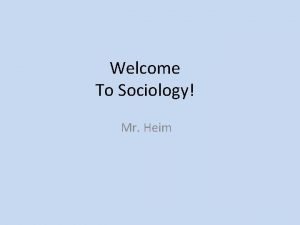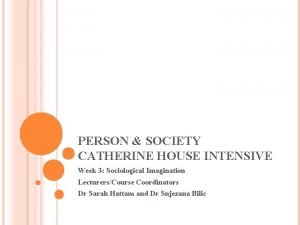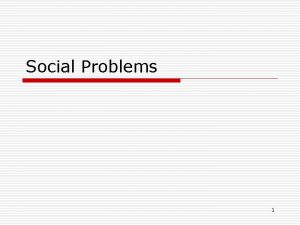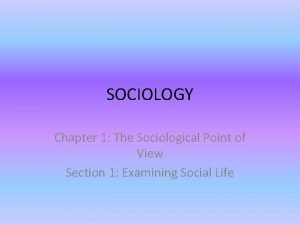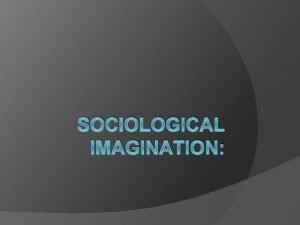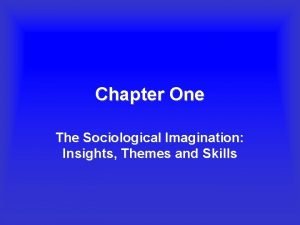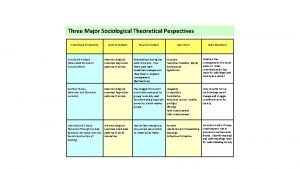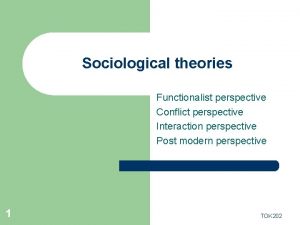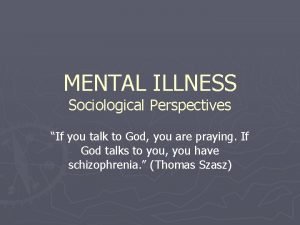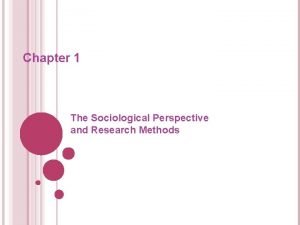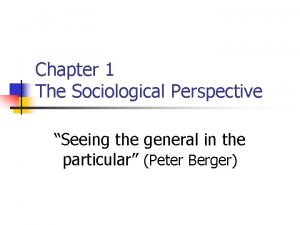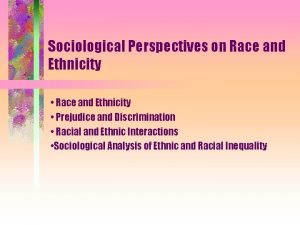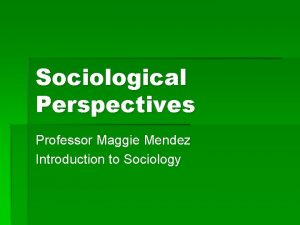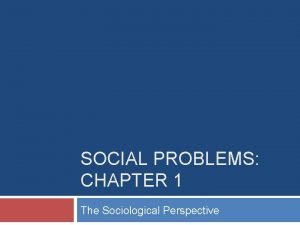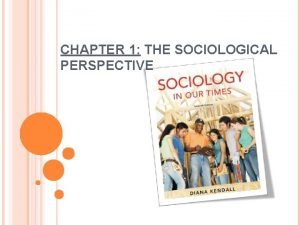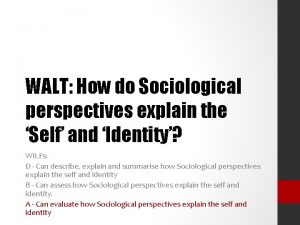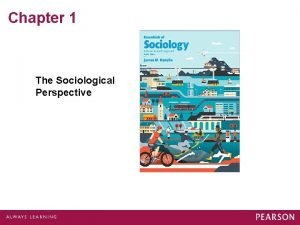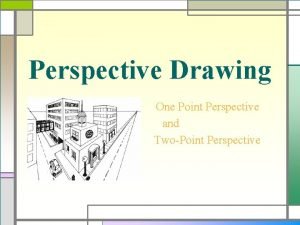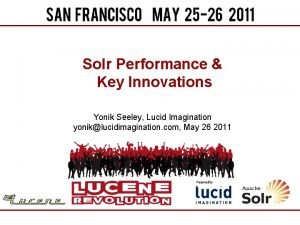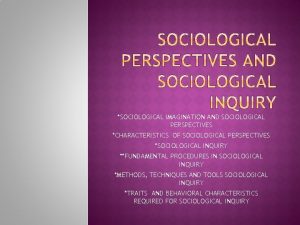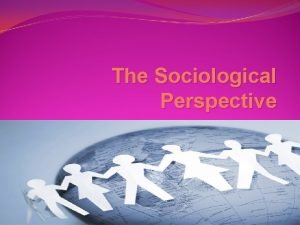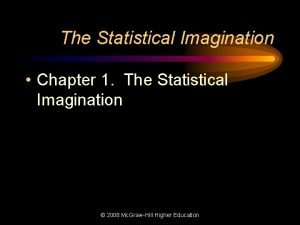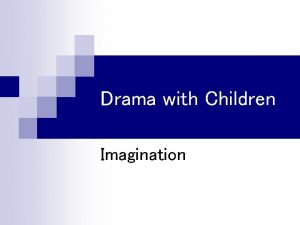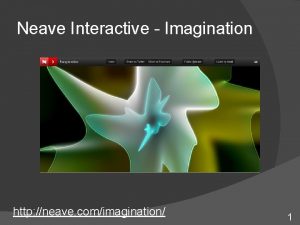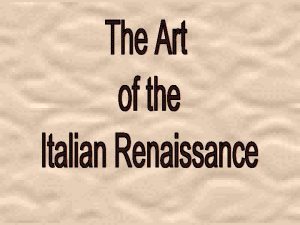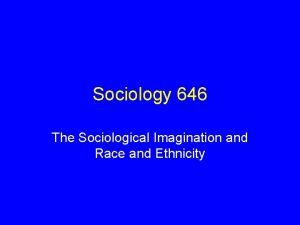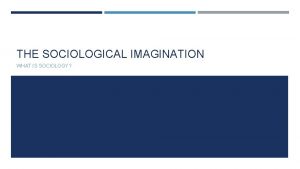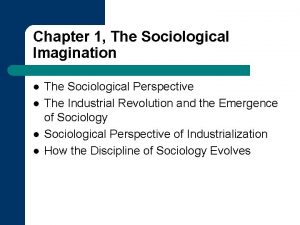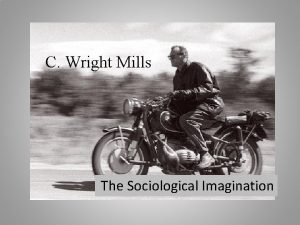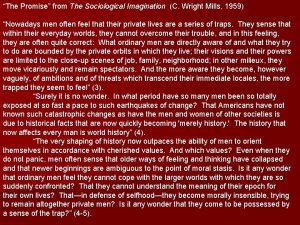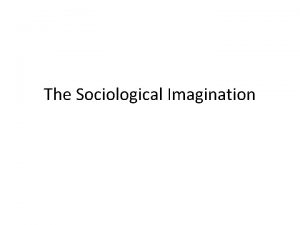What is a Sociological Perspective Sociological imagination The
































- Slides: 32

What is a Sociological Perspective?

Sociological imagination The ability to see the impact of social forces on individuals’ private and public lives. C. Wright Mills, 1959

Sociological Perspective � Stresses the Social Contexts in which people live. � How people are influenced by society… › Social location �Gender �Age �Race, ethnicity �Class �Culture

How are people (i. e. you) shaped by society?

Vocabulary �Paradigm �Consensus �Macro �Micro

Origins of Sociology � Tradition v. Science › Tradition �based theories on superstition, myth, stars, bias…etc. �Untested… › Science �theories that can be tested using scientific method. › Soft-Science �Generalities, patterns of behavior

Perspectives Major Sociological Perspectives

Perspectives Sociologists look at events from a ‘Holistic’, or multi-dimensional perspective. i. e. Biopsychosocial perspective combines several perspectives and approaches. �Uses: �History �Psychology �Anthropology �Economics �Political Science �Literature �Science �Art �Etc.

Classical Perspectives �Positivism �Social Darwinism �Class Conflict �Social Integration �Protestant Ethic

Postvism the application of Scientific Method to the Social World � Auguste Comte (1798 - 1857) �“Father of Sociology” �First proposed using Scientific Method to understand society � Believed that society develop and progress through the following stages: �Religious, Metaphysical, and Scientific � Comte and other early social scientists assumed human behavior must obey laws of nature � (i. e. Newton's laws of motion) � If discovered, those laws could eliminate moral evils and create a better society i. e. the same way medical scientists discovered how diseases worked and eliminated a lot of human suffering.

Social Darwinism Survival of the Fittest � Herbert Spencer (1820 -1903) › Thought societies evolve from ‘lower’ to ‘higher’ civilized forms › Over time, the most capable survive, while the less capable die out. › Helping the ‘lower’ classes interfers with this natural process and holds back society � NOTE: Did Not conduct Scientific studies!!!

Class Conflict � Karl Marx (1818 -1883) › Class Conflict drives Human History �Bourgeoisie (owners) vs. Proletariat (workers) › Economic Determinism › Influenced many Sociologists esp. Conflict Theorists

Social Integration the degree to which people are tied to their social group � Emile Durkheim (1858 -1917) › Wanted sociology recognized as separate discipline › First Professor of Sociology › Show social forces affect people’s behavior.

Protestant Ethic ideal of self-denying, highly moral life accompanied by hard work and frugality. � Max Weber (1864 -1920) › Author Spirit of Capitalism › Disagreed with Marx �(economics is central force in society) › Religion is central force. �(key factor in rise of Capitalism)

Sexism in Early Sociology � Harriet Martineau (1802 -1876) � Focused on male perspectives � Women’s roles assigned to wife/mother � Only handful got higher educations � Writings of women ignored… i. e. �Jane Frohock �Lucretia Mott �Elizabeth Cady Stanton �Frances Perkins

Sociology in N. America � Early History › University of Kansas (1890) › *University of Chicago (1892) �George Herbert Mead (symbolic interactionist perspective) › Atlanta University (1897)

Women � Like European women, mostly ignored and denied positions, so many turned to activism. �Jane Addams �Emily Green Balch �Isabel Eaton �Charlotte Perkins Gilman �Florence Kelly �Elsie Clews Parsons �Alice Paul

Social Reform (Praxis) � Jane Addams (1860 -1935) › Most successful of the women › Worked for social justice �Co-founded Hull House �Co-founded American Civil Liberties Union �Campaigned for Child Labor Laws �Eight hour work day › Co-winner of Nobel Peace Prize (1931) (first sociologist to do so!)

African American Contrib. W. E. B. Du Bois (1868 -1963) Minority professionals also found it difficult to find positions and contribute in the field due to racism. Also turned to social action.


Theory vs. Reform � 1940’s � Two shifted from reform to theory Schools of thought: › Talcott Parsons (1902 -1979) �Developed models of society showing how everything worked together harmoniously (no need to fix) › C. Wright Mills (1916 -1962) �Urged social reform, (need to fix) �The Power Elite/ inequality threatens

Applied Sociology ‘the middle way’ � Theory vs. Reform leads to Applied Sociology � The use of sociology to solve problems � Division still exists: › Want focus on social reform › If applied social work, not sociology

3 Main Theoretical Perspectives in Sociology… � Symbolic Interactionism � Functional Analysis � Conflict Theory › Macro – Large scale patterns in society › Micro – patterns between individuals

Symbolic Interactionism � Considers symbols in daily life � what these symbols mean � How people interact with each other › People attach meanings to symbols and act according to their interpretations of them �Language (verbal and written) �Music, clothing, etc.

Critique � Neglects the macro level of social interactions i. e. The Big Picture � Dismisses the influence of social forces and institutions on individual interactions

Functionalism � Each aspect of society is interdependent and contributes to society’s functioning as a whole. � Held together by social consensus and cooperation. �Mechanical Solidarity- maintain similar values and beliefs and engage in similar types of work. �Organic Solidarity- interdependent, but have varied beliefs and work.

Critique � Neglects the negative functions �i. e. divorce � Justifies the status quo � Doesn’t encourage change � See active social change as undesirable because will take care of itself.

Conflict theory � Focuses on conflict and change › Dialectics � Challenge the status quo � Encourages social change

Critique � Negative (focus on problems) � Cynical �i. e. sees the system as manipulative and having ulterior motives � Sees capitalism as controlling the masses �not as preserving society and social order

Other Perspectives: � Cross-Species �Considers the similarities in differences between human and social behavior and that of other animals. � Cross-Cultural �Compares customs and standards of behavior within a community or system. � Statistical perspective �How often an attitude or practice occurs within any given group.

Perspectives Continued: � Historical Perspectives �Deals with social issues from the point of view of historical attitudes, values, practices and contexts. � Religious Perspective �Considers the effects that religious doctrines, scriptures, and spirituality have in individuals and society. � Feminist Perspective �Concerned with gender differences and the limitations associated with traditional , male dominated theories of society.

Integrated Perspective � NOTE: › All perspectives have strengths and weaknesses and present a single-sided, distorted picture of society. › Some compliment each other, some contradict. › Integrated approach gives the fullest understanding of issues.
 Sociological imagination vs sociological perspective
Sociological imagination vs sociological perspective Sociological.imagination
Sociological.imagination Sociological imagination abortion
Sociological imagination abortion Sociological imagination
Sociological imagination Sociological imagination examples race
Sociological imagination examples race Define social issue
Define social issue By adopting a sociological imagination
By adopting a sociological imagination Youtube sociological imagination
Youtube sociological imagination The sociological imagination chapter 1 summary
The sociological imagination chapter 1 summary Two sociological theoretical perspective? *
Two sociological theoretical perspective? * Functionalist vs conflict theory
Functionalist vs conflict theory Sociological perspective on mental health
Sociological perspective on mental health Chapter 1: the sociological perspective answers
Chapter 1: the sociological perspective answers Peter berger seeing the general in the particular
Peter berger seeing the general in the particular Sociological perspective on race in philippines
Sociological perspective on race in philippines Micro sociological perspective
Micro sociological perspective Social issue examples
Social issue examples Sociological theories of crime
Sociological theories of crime The sociological perspective is a point of view that
The sociological perspective is a point of view that Macro level sociology
Macro level sociology Front stage vs backstage self
Front stage vs backstage self The sociological perspective stresses that
The sociological perspective stresses that Sociological perspective
Sociological perspective Chapter 1 the sociological perspective
Chapter 1 the sociological perspective Silo perspective vs business process perspective
Silo perspective vs business process perspective One point perspective house
One point perspective house Empowering imagination
Empowering imagination Maxine greene releasing the imagination
Maxine greene releasing the imagination Imagination acrostic poem
Imagination acrostic poem Empowering imagination
Empowering imagination Solr
Solr General electric imagination at work
General electric imagination at work Exercise your imagination
Exercise your imagination

